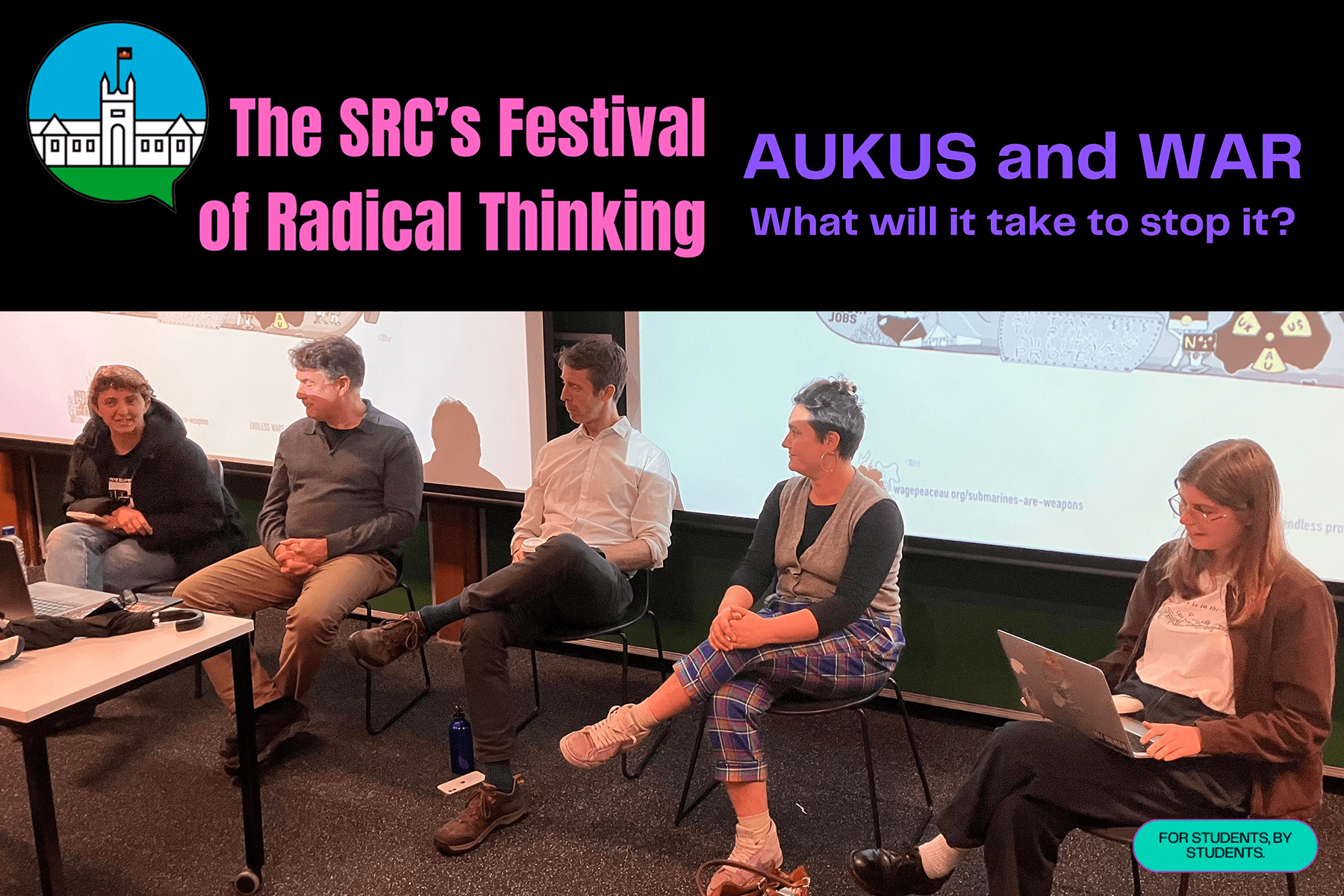Radical Education Week began in 2016, with the goal of discussing new futures, new solutions, and new visions for the problems facing the world today. Seven years later, it continues to challenge the status quo and provides a platform for activists to speak a better world into existence.
AUKUS, the security pact between Australia, the UK, and the US involving nuclear submarines — and foreign policy that seems to be calling for conflict instead of avoiding it — was the focus of this panel. At its core the event was centred around the perennially large question, what will it take to stop war?
Chaired by Ishbel Dunsmore, the panel consisted of Lilli Barto, environmentalist and activist from Wage Peace, Jake Lynch, USyd academic and peace journalist, David Brophy, a USyd historian, and Yasmine Johnson, activist and a USyd SRC Education Officer.
Dunsmore opened the panel with an acknowledgment that so-called Australia’s very inception was a state founded in militarism, referencing ongoing colonisation, and acknowledging that the forum was taking place on stolen Gadigal Land — where sovereignty has never been ceded.
Sovereignty was a key area that was addressed throughout the panel, with the opening question exploring whose sovereignty is maintained through AUKUS.
Johnson spoke of the US hegemony, and how perceptions of China threatening that power dynamic was a key contributor to the AUKUS deal. Brophy also mentioned that AUKUS “was a response to Trump being less interested in maintaining alliances in China”. He drew attention to how traditionally Australia has had a “paranoid hostile stance towards a place like China, that has been held in equilibrium by the business appeal of China,” however this has been called into question after trade relations between the two nations “broke down”.
Lynch highlighted British sovereignty, calling the post-Brexit nation a “vat of toxic nostalgia”, determined to reinstate itself as a powerful nation. Australia agreeing to AUKUS, according to Lynch, means it has become the political “fig leaf of the UK”. Barto linked the struggling UK nuclear industry to the AUKUS deal, which will see significant money being poured into the industry.
“Is China actually a threat?” was another question posed by Dunsmore.
The panel reached a quick consensus — Brophy stated immediately that “the simple answer is no.” This answer was then built upon by examining the historical context, with the Monroe doctrine in the South Pacific, and the fear of abandonment embedded into foreign policy in the region, laying the foundation for the AUKUS deal.
Dunsmore then linked it back to the University of Sydney context, and was critical of the close ties between Thales and USyd Chancellor Belinda Hutchinson, and the recent federal budget allocating additional university places to AUKUS. Johnson echoed similar sentiments.
Lynch wisely stated that “the onus is on all of us to look beyond the dyadic representation of a conflict, to look at all sides of it.”
Dunsmore then asked, what are we as individuals meant to do when faced with the overwhelming disaster that is AUKUS? How are we to fix it?
Johnson highlighted that war is not an abstract concept — it has material impacts “conscription, cost of living,” war has “a significant impact on people’s lives”. Brophy spoke of the perception that “foreign policy is considered a realm of decision-making removed from democratic influence” and argued that this was not true. He stated that “aiming for big conference types events that keep the media and public interested in, and aware of AUKUS” is a good way to ensure that people understand it as something they should, and can, demand governments to change.
Barto eloquently answered this question of material action by stating “as organisers all we have is each other, no one action, no one event, no one campaign, no one thing has ever won anything.”
“Prioritise and preserve relationships; the movement is made of relationships.”
It was a reminder that stood out to me, a message that moved beyond the petty dealings of politics and egos, and into something more crucial for activism to be successful — each other.
AUKUS is a deal that places Australia’s national security under significant threat. War benefits the pockets of companies, universities and governments, at the expense of people. Radical Education Week may be over for this year, but the ideas and discussions that occurred there are not. In the case of AUKUS, bipartisanship is a poison on democracy. While politicians call for AUKUS, the vast majority of Australians are opposed to it. This event was a reminder that it is incumbent upon us — activists, scholars, and indeed you, reading this — to stop the self-fulfilling prophecy of war that AUKUS demands.





